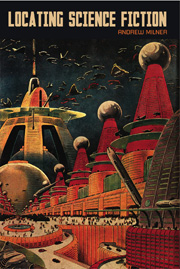Book contents
- Frontmatter
- Contents
- Acknowledgements
- List of Figures
- 1 Memories of Dan Dare
- 2 Science Fiction and Selective Tradition
- 3 Science Fiction and the Cultural Field
- 4 Radio Science Fiction and the Theory of Genre
- 5 Science Fiction, Utopia and Fantasy
- 6 Science Fiction and Dystopia
- 7 When Was Science Fiction?
- 8 Where Was Science Fiction?
- 9 The Uses of Science Fiction
- Works Cited
- Index
4 - Radio Science Fiction and the Theory of Genre
- Frontmatter
- Contents
- Acknowledgements
- List of Figures
- 1 Memories of Dan Dare
- 2 Science Fiction and Selective Tradition
- 3 Science Fiction and the Cultural Field
- 4 Radio Science Fiction and the Theory of Genre
- 5 Science Fiction, Utopia and Fantasy
- 6 Science Fiction and Dystopia
- 7 When Was Science Fiction?
- 8 Where Was Science Fiction?
- 9 The Uses of Science Fiction
- Works Cited
- Index
Summary
Perhaps the most striking feature of the previous chapter's mapping of the SF field is that, to date, only one of these many and various SF forms, commercial radio SF drama, has actually become extinct. Its absence from the contemporary cultural field is arguably ‘symptomatic’, in the Althusserian sense of the term, that is, it signifies something much more generally significant about the structure and function of the whole field (Althusser and Balibar, 1970, 316). What exactly that might be, will be the subject of this chapter.
In the mid 1960s, Professor A.J.P. Taylor, the distinguished Oxford historian, opined, with all the authority of the Clarendon Press behind him, that ‘Radio offered words without pictures, … the silent film … pictures without words. Both were … doomed to disappear when technical advance brought words and pictures together’ (Taylor, 1965, 233–34). He was more or less right about silent film, but absolutely wrong about radio, which still thrives well into the twenty-first century, not only in England but also globally. Taylor's dismissive reaction to radio was, nonetheless, neither eccentric nor idiosyncratic. Quite the contrary, perhaps the strangest thing about radio drama is not that it continues to flourish, but that it continues to be an object of near indifference, not only for literary studies, but also for media and cultural studies more generally. We should not be too surprised by the former, given that academic literary criticism has tended to treat all post-print media with a certain disdain.
- Type
- Chapter
- Information
- Locating Science Fiction , pp. 68 - 88Publisher: Liverpool University PressPrint publication year: 2012



